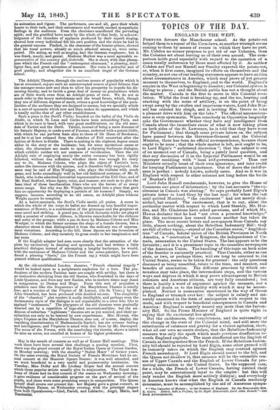The Adelphi Theatre, through-the curious means of popularity which it
has at command, enjoys such an uninterrupted course of good fortune, that the manager seems now and then to allow his prosperity to impede his dis- cerning faculty, and to lavish a great deal of money on productions which are of little worth even from an Adelphi point of view. We do not so much refer to the heavy melodramas and the broad farces, which, though they are of different degrees of merit, evince a good knowledge of the pecu- liarities of the audience they are designed to amuse; but we specially allude to a sort of spectacle which now and then makes its appearance, and which is totally unlike that of any other establishment.
Such a piece is the Devil's Violin; founded on the ballet of the Violin du Diable, in which St. Leon and Cerito -have beep astonishing Paris, and which in its turn is based, with very great modifications, on the old anec- dote of Tartini and the Devil. Tartini, instead of being a mere dreamer of his Satanic Majesty, is wade a sort of Faustus, endowed with a potent fiddle, with which he can perform feats akin to those of Sir Huon of Bordeaux; and he is at last released from the clutches of Evil somewhat after the fashion of Robert le Diable. There is nothing in the slightest degree comic either in the story or the incidents; but, for some mysterious cause or other, the characters are made to speak a rhyming burlesque dialogue, which exhibits neither wit nor neatness of versification. Then the old Adelphi rule of employing nearly the entire company has been rigidly followed, without due reflection whether there was enough for every one to do. Madame Celeste, who plays the object of Tartini's love, unites the danseuse with the actress, and is therefore fully employed; the same may be said of Miss Woolgar, who plays the violinist with much grace, and looks exceedingly well in her old-fashioned costume; of Mr. 0. Smith, who is the admitted terrestrial representative of the Evil One; and of Mr. Paul Bedford, whose figure, voice,-and manner, are such as to give the beau ideal of those bacchanalian friars who are the heroes of so many comic songs. But why was Mr. Wright introduced into a piece that gave him no opportunity for displaying a particle of his humour? Simply, we suppose, because, according to an old canon, an Adelphi piece without Wright cannot be complete.
As a ballet-spectaole, the Devil's Violin merits all praise. A scene in which the whole of the corps de ballet are dressed up into fanciful imper- sonations of flowers, is a combination of the grotesque and the gorgeous at once novel and striking. A grand pas, in which fantastic tricks are played with a number of crimson ribbons, is likewise remarkable for the richness and unity of the groups; while a pas de deux by Madame Celeste and Miss Woolgar, in which the former assumes the shape of a female daemon, has a -character about it that distinguished it from the ordinary run of superna- tural visitations. According to the bill, these dances are the invention of Madame Celeste; and they certainly do great credit to her imagination and her taste.
If the English adapter had seen more clearly that the attraction of the piece lay exclusively in dancing and spectacle, and had written a little practical dialogue instead of attempting a lengthy burlesque, he would, with the assistance of Madame Celeste and the scene-painters, have pro- duced a pleasing " fderie," (as the Frenoh say,) which might have been praised without qualification.


























 Previous page
Previous page